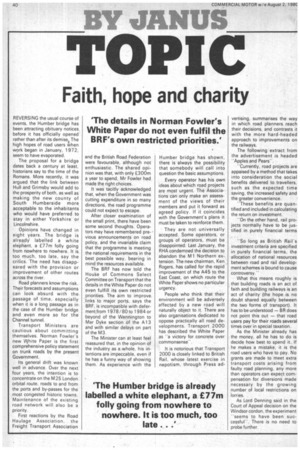TI C
Page 42

If you've noticed an error in this article please click here to report it so we can fix it.
Faith, hope and charity
'The details in Norman Fowler's White Paper do not even fulfil the BRF's own restricted priorities.'
REVERSING the usual course of events, the Humber bridge has been attracting obituary notices. before it has officially opened rather than after its demise, The high hopes of road users yhen work began in January, 1972, seem to have evaporated.
The proposal for a bridge dates back a century at least, historians say to the time of the Romans. More recently, it was argued that the link between Hull and Grimsby would add to the prosperity of both, as well as making the new county of South Humberside more acceptable to the inhabitants who would have preferred to stay in either Yorkshire or Lincolnshire.
Opinions have changed in eight years. The bridge is already labelled a white elephant, a E.77m folly going from nowhere to nowhere. It is too much, too late, say the critics. The need has disappeared with the provision or improvement of other routes across the river.
Road planners know the risk. Their forecasts and assumptions can look absurd with the passage of time, especially when it is a long passage as in the case of the Humber bridge and even more so for the Channel tunnel.
Transport Ministers are cautious about committing themselves. Norman Fowler's new White Paper is the first comprehensive policy statement on trunk roads by the present Government.
Its general drift was known well in advance. Over the next four years, the intention is to concentrate on the M25 London orbital route, roads to and from the ports and by-passes for the most congested historic towns. Maintenance of the existing road network will also be a priority.
First reactions by the Road Haulage Association, the Freight Transport Association and the British Road Federation were favourable, although not enthusiastic. The shared opinion was that, with only £300m a year to spend, Mr Fowler had made the right choices.
It was tacitly acknowledged that, when the Government was cutting expenditure in so many directions, the road programme could not expect to escape.
After closer examination of the small print, there have been some second thoughts. Operators may have remembered previous announcements on road policy, and the invariable claim that the programme is meeting the national requirements in the best possible way, bearing in mind the resources available.
The BRF has now told the House of Commons Select Committee on Transport that the details in the White Paper do not even fulfill its own restricted priorities. The aim to improve. links to major ports, says the BRF, is incompatible with deferment from 1978 / 80 to 1984 or beyond of the Wennington to Mar Dyke section of the Al 3 and with similar delays on part of the M3.
The Minister can at least feel reassured that, in the opinion of the industry as a„whole, his intentions are impeccable, even if he has a funny way of showing them. As experience with the Humber bridge has shown, there is always the possibility that somebody will call into question the basic assumptions.
Every operator has his own ideas about which road projects are most urgent. The Associations can only make an assessment of the views of their members and put it forward as agreed policy. If it coincides with the Government's plans it must be taken to reinforce them.
They are not universally accepted. Some operators, or groups of operators, must be disappointed. Last January, the RHA condemned the decision to abandon the M1 Northern extension. The new chairman, Ken Rogers, has called for the rapid improvement of the A45 to the East Coast, on which route the White Paper shows no particular urgency.
People who think that their environment will be adversely affected by a new road will naturally object to it. There are also organisations dedicated to oppose practically all road developments. Transport 2000 has described the White Paper as ''a victory for concrete over commonsense".
It is notorious that Transport 2000 is closely linked to British Rail, whose latest exercise in nepotism, through Press ad vertising. summarises the way in which road planners reach their decisions, and contrasts it with the more hard-headed approach to improvements on the railways.
The following extract from the advertisement is headed "Apples and Pears-.
"Currently, road projects are appaised by a method that takes into consideration the social benefits delivered to travellers, such as the expected time saving, the increased safety and the greater convenience.
"These benefits are quantified and included in calculating the return on investment.
-On the other hand, rail projects normally have to be justified in purely financial terms -So long as British Rail's investment criteria are specified in purely financial terms, the allocation of national resources between road and rail development schemes is bound to cause controversy.
What this means roughly is that building roads is an act of faith and building railways is an act of charity (the hope is no doubt shared equally between the two forms of transport). It has to be understood — BR does not point this out — that road users pay for their roads several times over in special taxation.
As the Minister already has the money, all he has to do is decide how best to spend it. If he makes a mistake, it is the road users who have to pay. No grants are made to meet extra transport costs arising from faulty road planning, any more than operators can expect compensation for diversions made necessary by the growing number of local restrictions on lorries.
As Lord Denning said in the Court of Appeal decision on the Windsor cordon, the experiment 'seems to have been successful-. There is no need to probe further.




























































































